

Lancet 17.03.21 Reinfección Ed. Lancet 17.03.21 Reinfección rara más común en ancianos. MPR 18.03.21 SARS CoV 2 Reinfection Rate Higher Among People 65 Years or Older. 01.03.21 NEM Journal Watch Considerable Protective Immunity May Persist for 7 Months After COVID 19. Jamainternal katz 24.02.21 cómo informar Infección futura y seropositividad. Jamainternal harvey 24.02.2021 Seropositividad y riesgo futura infección. MMWR 26.02.21 Suspected Recurrent SARS-CoV-2 Infections Among Residents of a Skilled Nursing Facility During a Second COVID-19 Outbreak — Kentucky, July–November 2020.
After receiving positive COVID-19 test results during a SNF outbreak and subsequently receiving four to five negative SARS-CoV-2 RT-PCR test results, five residents received positive results >90 days later during the facility’s second COVID-19 outbreak, suggesting SARS-CoV-2 reinfection.
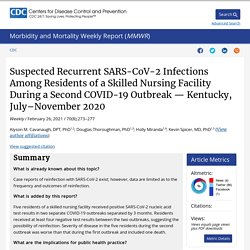
All patients with recurrent COVID-19 experienced more severe disease during the second outbreak, and one died. The exposure history, including the timing of roommates’ infections and the new onset of symptoms during the second outbreak, suggest that the second positive RT-PCR results represented new infections after the patients apparently cleared the first infection. The finding that all five patients with recurrent COVID-19 had either asymptomatic or mildly symptomatic courses during their first infections is noteworthy, suggesting the possibility that asymptomatic or mildly symptomatic initial infections do not produce a sufficiently robust immune response to prevent reinfection (5). MPR 08.02.21 Case Study Severe Case of Reinfection With New Variant of SARS CoV 2 Confirmed in UK Hospital. NEJM Jourrnal Watch 18.01.21 How Long Does Immunity Last After Recovery from Mild COVID 19. Bmj. 19.01.21 Reinfección.
MPR 22.01.21 Duración Ac. Bmj. 14.01.21 Covid inmunidad dura 5 meses pero no frena transmisión. MPR 13.01.21 Rapid Decay of IgA and IgM Following COVID 19 Infection. Antibody Responses 8 Months after Asymptomatic or Mild SARS-CoV-2 Infection - Volume 27, Number 3—March 2021 - Emerging Infectious Diseases journal - CDC. Disclaimer: Early release articles are not considered as final versions.
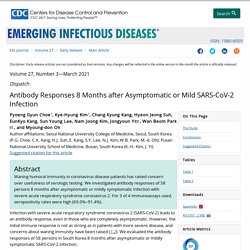
Any changes will be reflected in the online version in the month the article is officially released. Author affiliations: Seoul National University College of Medicine, Seoul, South Korea (P.G. Nejm23 12 Anticuerpos duración. Medscape 23.12. Anticuerpos duración. Medscape 16.12 COVID y reeinfección. J Clin Investig 30.11 Reinfección por COVID más leve que primoinfección. J Clin Inv Sept Reinfección menor gravedaaad. BiorVix 15.11 Duraión respuestaa inmunitaria. Immunity to the Coronavirus May Last Years, New Data Hint. “Sterilizing immunity doesn’t happen very often — that is not the norm,” said Alessandro Sette, an immunologist at the La Jolla Institute of Immunology and co-leader of the study.
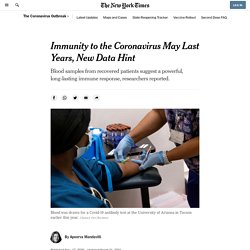
More often, people become infected a second time with a particular pathogen, and the immune system recognizes the invader and quickly extinguishes the infection. The coronavirus in particular is slow to do harm, giving the immune system plenty of time to kick into gear. “It may be terminated fast enough that not only are you not experiencing any symptoms but you are not infectious,” Dr. Sette said. Dr. The team tracked four components of the immune system: antibodies, B cells that make more antibodies as needed; and two types of T cells that kill other infected cells.
“If you just look at only one, you can really be missing the full picture,” Dr. The study is the first to chart the immune response to a virus in such granular detail, experts said. Medwix 23.10 Autooanticuerpos. Science 28.10. Ac persistentes. 20.20 MPR Decrease in Antibodies to SARS CoV 2 Seen Over 60 Days Among Health Care Personnel. Lancet Infect Dis 12.10 Reinfección Eitorial.
Lancet Infect Dis 12.10 Reinfección case report. MPR 15.10. Descenso de Ac con el tiempo. Lancet Infect Dis 12.10 Reinfección. Nejm sept Rápido descenso de AC en COVID leve. Bmj 17.09 Inmunidad preexistente. Jama 17.09. Disminución de Ac a los 60 días. Jama stephens 11.09. COVID e inmunidad. NEJM Journal Watch: Reinfección.
30.08 Paul Sax-Cases of SARS-CoV-2 Reinfection Highlight the Limitations. A New World of Creatures, Invisible to the Human Eye.
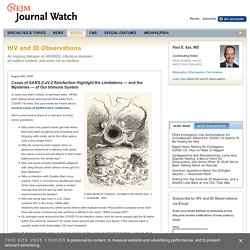
J. J. Grandville, 1842. In case you didn’t notice, or perhaps were “off the grid” taking some well-earned time away from COVID-19 news, this past week we heard about several cases of SARS-CoV-2 reinfection. Nevada State Public Health Lab-led team studying COVID-19 reinfection: 8/27/20: University of Nevada, Reno School of Medicine. Scientists at the University of Nevada, Reno School of Medicine (UNR Med), led by its Nevada State Public Health Laboratory (NSPHL) are studying a likely case of COVID-19 reinfection.
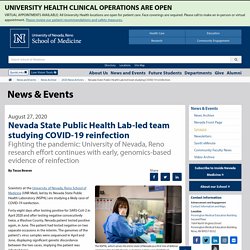
Forty-eight days after testing positive for SARS-CoV-2 in April 2020 and after testing negative consecutively twice, a Washoe County, Nevada patient tested positive again, in June. The patient had tested negative on two separate occasions in the interim. The genomes of the patient's virus samples were sequenced in April and June, displaying significant genetic discordance between the two cases, implying the patient was infected twice. "We examined the genomic material of the viruses and samples to investigate this, says Pandori. First Documented Coronavirus Reinfection Reported in Hong Kong. Michael barbaro From The New York Times, I’m Michael Barbaro.
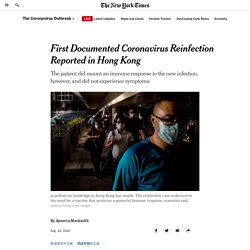
This is “The Daily.” COVID Immune Responses Explained. Find the latest COVID-19 news and guidance in Medscape's Coronavirus Resource Center.
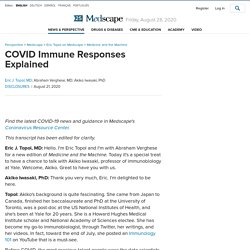
This transcript has been edited for clarity. Eric J. Topol, MD: Hello. I'm Eric Topol and I'm with Abraham Verghese for a new edition of Medicine and the Machine. Today it's a special treat to have a chance to talk with Akiko Iwasaki, professor of immunobiology at Yale. Akiko Iwasaki, PhD: Thank you very much, Eric. Nature 26.08 Respuesta inmunitaria por sexos. Jamainternal 18.08 Factores que incfluyen en los niveles de AC. NEJM 21.07 rápido descenso AC en COVID leve. Nature Med Respuesta inmunitaria en asintomáticos. 10. Nature Virus replicación anticuerpos 01.04. JAMA kirkcaldy 11.05 COVID e inmunidad. NYT 06.05 llama coronavirus anticuerpos. Jama 06.05 Ética y pasaportes de inmunidad. Jama 06.05 Certificación de inmunidad. Medscape 5 enigmas inmunológicos COVID. What Do Antibody Tests For SARS-CoV-2 Tell Us About Immunity?
MedRvix 30.03 Variabilidad en el título de AC en pac recuperados. There's "no evidence" coronavirus survivors can't be reinfected, WHO says. The World Health Organization (WHO) said there is "no evidence" that survivors of COVID-19 cannot be reinfected with the virus.
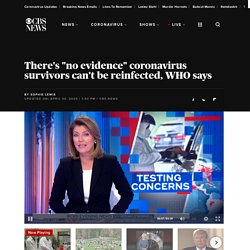
In a statement Saturday morning, WHO warned that antibodies may not adequately protect survivors, leaving them vulnerable to a second coronavirus infection. The warning came as several countries, including the United States, are considering allowing people who have recovered to carry "immunity passports" or "risk-free certificates. " That documentation would allow survivors to return to work and other activities under the assumption that they are immune from the virus. WHO later tweeted that it wanted to "clarify" its warning, and explained that while "We expect that most people who are infected with #COVID19 will develop an antibody response that will provide some level of protection," experts don't yet know "the level of protection or how long it will last.
" Earlier today we tweeted about a new WHO scientific brief on "immunity passports". South Korea Experts Say Recovered Coronavirus Patients Retested Positive Because of 'Dead' Virus Parts. Health experts in South Korea are addressing the nation's growing incidence of former coronavirus patients who have retested positive for the disease after having previously recovered.
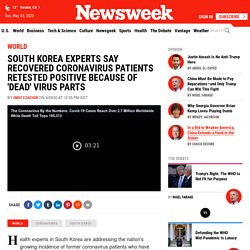
According to Korea Centers for Disease Control and Prevention, figures published Wednesday indicated that 292 people countrywide had tested positive for the respiratory illness since initially contracting it and later testing negative, suggesting conceivable recovery from infection. However, discussing the upward trend in positive retests during a recent news conference, officials from KCDC's clinical committee for emerging disease control said the pattern does not necessarily reflect a reoccurrence of active infection. Committee head Oh Myoung-don instead attributed positive test results following recovery to "dead," or inactive, virus components still present in patients' cells, multiple outlets based in South Korea reported on Wednesday. WHO. 24.04 Pasaporte de inmunidad. ¿Cuál es el riesgo de reinfección por coronavirus SARS–CoV–2? Respuestas COVID-1917 marzo 2020 | Centro Cochrane Iberoamericano Mensajes clave En estos momentos no existen suficientes pruebas para afirmar que sea posible la reinfección con el SARS–CoV–2, pero continuamente se están generando nuevos datos y esta información puede cambiar en el futuro.Los datos indirectos disponibles de otros coronavirus (SARS) y de modelos animales sugieren que es plausible esperar la generación de inmunidad (al menos al corto plazo) tras la recuperación por SARS–CoV–2.Se han descrito algunos casos de pacientes que han tenido nuevamente un resultado positivo a SARS–CoV–2 tras ser dados de alta, pero es probable que esto se deba a errores en la toma de las muestras o, en algunos casos, a una recuperación prolongada, aunque asintomática, con positividad oscilante al virus.La Organización Mundial de la Salud ha sugerido el aislamiento durante los 15 días posteriores a la remisión de síntomas de los pacientes con COVID–19.
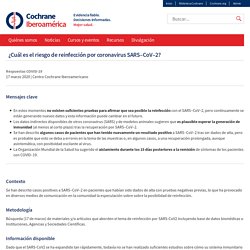
Contexto Metodología Información disponible. El coronavirus podría "reactivarse" en pacientes curados según sugieren más de 70 casos detectados en Corea del Sur. Corea del Sur ha anunciado este jueves el registro de 39 nuevos casos de COVID-19, la cifra más baja desde finales de febrero cuando alcanzó un pico de 909 positivos. El lento avance de los contagios y la reducida cifra de fallecidos, situada ahora mismo en 204 personas frente a las 15.000 de España, han provocado que muchos análisis destaquen al país como uno de los que mejor ha controlado la epidemia. El país asiático no ha ordenado aislamientos como los de Wuhan, Italia o España, sino que pidió distanciamiento social desde el primer minuto, recomendó el uso de mascarillas a la población y puso en marcha un agresivo plan para hacer pruebas con el objetivo de identificar a los infectados y trazar cualquier contacto directo de los contagiados.
¿Puede una persona que haya tenido COVID-19 volver a infectarse por este coronavirus? La pandemia por SARS-CoV-2 está generando un gran número de investigaciones científicas y cada vez se conoce más de esta infección y del virus que la provoca.